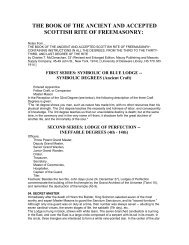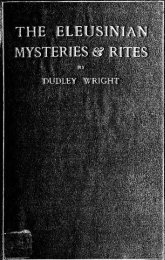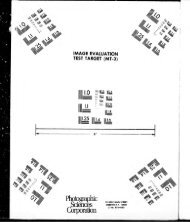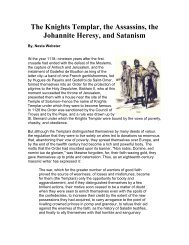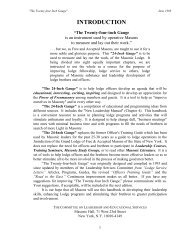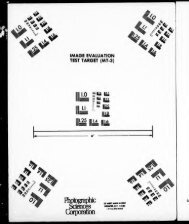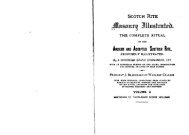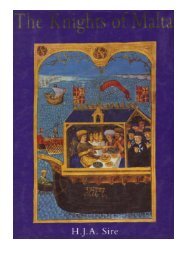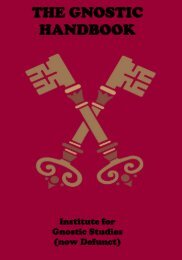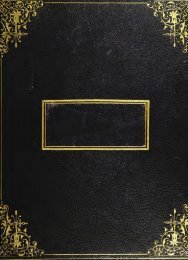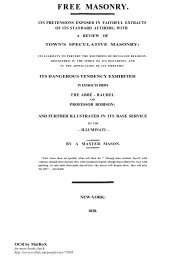The History of Initiation - The Masonic Trowel
The History of Initiation - The Masonic Trowel
The History of Initiation - The Masonic Trowel
Create successful ePaper yourself
Turn your PDF publications into a flip-book with our unique Google optimized e-Paper software.
88 HISTORY OF INITIATION<br />
silence, temperance, fortitude, prudence, and justice. He<br />
proceeded to inculcate the omnipresence <strong>of</strong> God, the<br />
immortality <strong>of</strong> the soul, and the necessity <strong>of</strong> personal<br />
holiness to qualify man for admission into the society <strong>of</strong><br />
the gods and declared his ;<br />
opinion that no man could be<br />
accounted happy or miserable till the day <strong>of</strong> his death ;<br />
because, in his most exalted moments he is not able to<br />
pry into futurity, or to divine to-day what evils to-morrow<br />
may bring upon him.<br />
He taught that man is endowed with eight organs <strong>of</strong><br />
knowledge to which symbolical institution might be<br />
usefully applied ;<br />
32 and these were, sense ? phantasy, art,<br />
municate not your mysteries to an idle or foolish person, for such an<br />
one will disgrace and betray you. Sleep not at noon. Shut not your<br />
eyes against the Light <strong>of</strong> knowledge at a time when its hidden stores<br />
are most clearly displayed before you, lest the remainder <strong>of</strong> your life<br />
be passed amidst the uncertain glimmering <strong>of</strong> twilight, or the shades <strong>of</strong><br />
midnight darkness the mists <strong>of</strong> ; imperfect information, or the dark<br />
clouds <strong>of</strong> total ignorance. <strong>The</strong> curious reader who wishes to pursue<br />
this subject further, may find all the symbolical sentences <strong>of</strong> Pythagoras<br />
in Stanley's Lives <strong>of</strong> the Philosophers, from which celebrated work the<br />
above have been extracted.<br />
32 <strong>The</strong> following are some <strong>of</strong> the symbols <strong>of</strong> : Pythagoras <strong>The</strong><br />
equilateral triangle, a perfect figure, refers to God, the principle and<br />
author <strong>of</strong> all sublunary things ; who, in his body, resembles Light,<br />
and in his soul Truth. He was, and is, and shall be. <strong>The</strong> right<br />
angle or square comprehends the union <strong>of</strong> the celestial and terrestrial<br />
capacities ; and was an emblem <strong>of</strong> Morality and Justice. <strong>The</strong> perfect<br />
square represents the divine mind, as has already been explained <strong>of</strong><br />
the Tetractys. <strong>The</strong> cube was a symbol <strong>of</strong> the mind <strong>of</strong> man after a<br />
well spent life in acts <strong>of</strong> piety and devotion ; which is thus perfectly<br />
prepared by virtue for translation into the society <strong>of</strong> the celestial<br />
gods. A point within a circle. A symbol <strong>of</strong> the universe. Mesouraneo,<br />
because the most excellent body ought to have the most<br />
excellent place, viz., the centre. <strong>The</strong> central fire was esteemed by<br />
Pythagoras, the mansion <strong>of</strong> Jove. <strong>The</strong> Dodecaedron was also a<br />
symbol <strong>of</strong> the universe. <strong>The</strong> triple triangle formed <strong>of</strong> five lines<br />
returning into itself, was a symbol <strong>of</strong> health, and was called Hygeia.<br />
<strong>The</strong> forty -seventh proposition <strong>of</strong> Euclid was invented by Pythagoras,<br />
and is so extensively useful that it has been adopted in all lodges<br />
since his time, as a significant symbol <strong>of</strong> Masonry. It is said by<br />
Apollodorus and other authors, that Pythagoras sacrificed a Hecatomb<br />
on the discovery <strong>of</strong> this useful problem. This, however, is<br />
exceedingly doubtful, because Pythagoras abhorred bloody sacrifices,<br />
and directed his followers to <strong>of</strong>fer nothing but cakes and wine, herbs,<br />
flowers, and fruit. <strong>The</strong> letter Y. This symbolical character represented<br />
the course <strong>of</strong> human life. Youth, arriving at manhood, sees<br />
two ways before him, and deliberates which he shall pursue. If he



